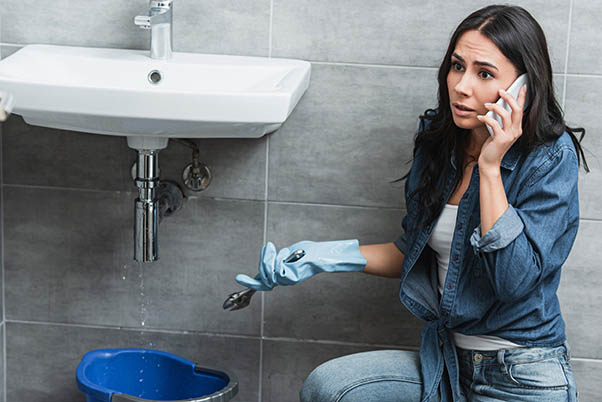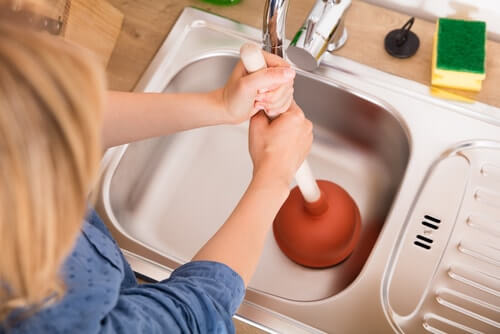Addressing Emergency Plumbing Problems: Fast Tips Until Professional Help Arrives
Addressing Emergency Plumbing Problems: Fast Tips Until Professional Help Arrives
Blog Article
The writer is making a few great annotation on Plumbing Emergencies: Tips on What To Do Before as a whole in the content underneath.

Plumbing emergencies can strike at any time, creating stress and anxiety and possible damage to your home. Whether it's a burst pipe, a clogged drainpipe, or a dripping tap, understanding how to take care of the circumstance up until an expert plumbing gets here can conserve you from additional problems. This article gives crucial emergency plumbing pointers to aid you alleviate damage and regain control throughout a plumbing crisis.
Switch off the Water System
The first step in any kind of pipes emergency is to shut off the water. For localized issues, such as a dripping faucet or toilet, switch off the valve near the fixture. When it comes to a major leak or ruptured pipe, situate your home's primary water shut-off valve and transform it off right away. Knowing the area of these valves beforehand can conserve important time throughout an emergency.
Address Small Leakages with Temporary Solutions
Little leakages can swiftly become substantial problems if left uncontrolled. Utilize these temporary repairs until expert help shows up:
While these fixes aren't long-term, they can help reduce water loss and damages.
Unclog Drains Securely
A clogged drain can be an irritating and messy problem. Below's exactly how to tackle it:
If these approaches don't work, prevent utilizing too much force, as it might get worse the blockage.
Handle Overflowing Toilets
An overruning commode can create immediate mayhem. Right here's what you must do:
Shut down Your Hot Water Heater
In particular emergency situations, such as a ruptured pipeline, it's important to turn off your hot water heater. This stops getting too hot or damages to the system when water stops streaming. Shut off the power supply to the water heater (electric or gas) and let it cool down to avoid potential risks.
Briefly Quit a Ruptured Pipeline
A ruptured pipeline can bring about substantial water damage in minutes. To alleviate the problem:
Call a professional plumbing right away to deal with the problem permanently.
Handle Frozen Piping Meticulously
In cooler environments, icy pipes are a typical emergency. If you suspect a frozen pipe:
Protect against Additional Damage
Taking fast action to decrease damage can save you time and money in the future. Right here's how:
. Have an Emergency Situation Plumbing Kit
Prepare a standard plumbing emergency situation kit to manage minor problems effectively. Your set should include:
Having these devices on hand can make a considerable difference in your capacity to manage emergency situations.
Know When to Call a Specialist.
While quick fixes can assist momentarily, certain plumbing concerns require instant specialist attention. Call a plumbing technician if:.
Immediately speaking to a professional guarantees the problem is settled correctly and avoids additional difficulties.
Conclusion.
Plumbing emergencies can be overwhelming, however with the appropriate knowledge and tools, you can manage the circumstance successfully up until assistance gets here. By switching off the water supply, dealing with little leaks, and utilizing momentary solutions, you can decrease damages and maintain your home safe. Bear in mind, these tips are temporary services; always speak with a licensed plumber to handle the root cause of the problem. Preparation and quick thinking are your best allies in any pipes emergency situation.
8 Helpful Tips for Managing Plumbing Emergencies at Home
If your plumbing system hasn’t failed once, wait for it because almost everyone has a story to tell. Sometimes, it could be simple emergencies such as a leaking pipe, a blocked cistern, or even a big burst pipe. In situations like this, you need to have some handy tips to save you some money and from possible damages.
Take care of minor issues early.
Sometimes, you could have avoided an emergency by taking proactive measures while it was still early. Some major plumbing emergencies can be a result of an ignored minor issue. We recommend that you have items like plumbing tapes and other related items. A plumbing tape can allow you to manage minor leaks before the plumber arrives.
Cut off the water supply.
This tip is essential in almost any type of leakage problem. For problems like minor leakages in the toilet or kitchen, turn off the supply that takes water to the affected pipes. If the leakage is a major pipe, you must shut off the supply valve to the entire building. This will help you avoid flooding your home and neighbors if you share a flat.
Know your plumbing system
Folks typically move into a new apartment without understanding the water supply around the building. This can prove disastrous if a water emergency arises and the plumber is far away. The previous tip will prove useless if you don’t practice this one. More importantly, know where your water shut-off valve is located – you’ll need that knowledge to prevent potential home floods.
Have some common handy tools
There are lots of plumbing emergencies that you can handle without hiring a plumber. That’s why you must keep some tools available always. Some tools that you can use to fix simple plumbing emergencies easily include plumbing tapes, screwdrivers, thread seal tapes, plungers, pliers, tape measures, and rubber gloves.
Insulate your pipes from cold
You’ll save yourself from many plumbing expenses if you protect your water pipes from the cold. This is because of the harmful effects that cold weather can have on your pipes. During winter, your pipes can burst from being overly expected to freezing temperatures. So, make sure insulators are there to keep the pipes working correctly.
Avoid practices that will clog your toilet.
Many people indulge in practices that can damage the plumbing system of the entire building. One of these is when they use their toilet to dispose-off garbage. They flush all kinds of things, such as paper towels, bandages, hairs, female sanitary products, etc., down the toilet. This will block your toilet in the long run, incurring unnecessary expenditures. Dump such waste in the trash instead.
Check your dials regularly.
Sometimes, there could be leakages in your home without noticing them in time. So, constantly monitor your water meter dial. If the dial is reading when there is nobody using water, this is an indicator that there is leaking. Check for leaks immediately. Call a plumber as soon as possible if you can’t find any.
https://www.constructionplacements.com/8-helpful-tips-for-managing-plumbing-emergencies-at-home/

I stumbled upon that content about What to Do While Waiting for an Emergency Plumber while doing a lookup on the web. For those who enjoyed reading our blog posting please do not forget to share it. I am grateful for being here. Kindly check up our website back soon.
Click Here Report this page